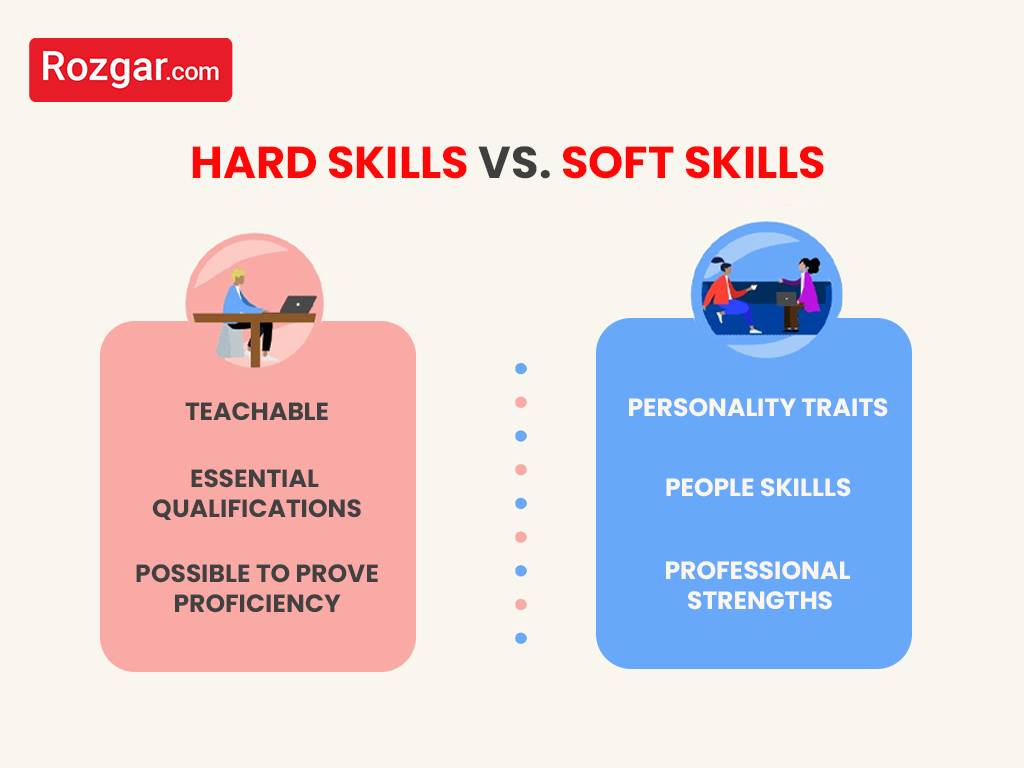
Are you aware that close to 48% of new hires fail in their job responsibilities within 18 months? Among those failures, nearly 11% are because of a lack of hard skills, and the remaining 89% are due to a paucity of soft skills.
Aren’t these statistics shocking?
Job descriptions often demand candidates to have a combination of both--hard skills and soft skills. When considering new hires, employers look for candidates with these skill sets. Experienced candidates understand the requirement of these skills and judiciously put them on display.
Both skills are equally important to outshine in a job profile. However, it is very crucial to understand the difference between these two skill sets.
We have our in-depth research and analysis presented in this article to help you understand the basic difference between these two-much needed skills.
Defining Hard Skills and Soft Skills
Acquired through education and training, hard skills relate to specific technical knowledge. Therefore, hard skills are those skills that can be learned and mastered with time.
Hard skills learning is quantifiable and thus, can be easily measured through experience, skill tests, etc. These skills are observed to identify how proficient the candidate is for a particular job profile or role.
Hard skills are quite helpful for recruiters to find the right and deserving candidate for a position. Moreover, it can be learned and upgraded with frequent learning sessions.
For example, – if your job demands in-depth SEO knowledge, you can learn it through online courses, training, and education sessions to master the skill.
On the other hand, soft skills can be gained while performing on the job. Soft skills are more intrinsic and are related to personality attributes such as time management, leadership, communication skills, etc.
Soft skills are the candidates’ personality traits, helping them to collaborate, cooperate, and develop valuable relationships at the workplace. These skills represent the candidates’ behavior, habits, nature, character, personality, etc.
Unlike hard skills, soft skills cannot be learned with any training or educational sessions, it can only be accomplished by working on yourself.
For example, – if you are an introvert, you cannot change it with new learning but you can improve it by practicing your communication skills.
Difference between Hard Skills and Soft Skills
The difference between hard skills and soft skills is pretty clear. The key differences between hard skills and soft skills are how they are acquired and put to use in the workplace.
Easy to measure and define, hard skills are used by employers to ascertain the competencies of candidates for a particular profile. On the contrary, soft skills are less defined skills that often are not limited to one specific job but are universal. These skills help the employees to build lasting relationships with their co-workers and the organization.
Developing hard skills vs. soft skills

Are you curious, between hard skills vs soft skills which is more important?
While hard skills train you to carry your job responsibilities effortlessly, soft skills are essential to execute your job efficiently without an emotional breakdown.
It won’t be wrong to say that a perfect blend of hard skills and soft skills can easily help you in getting hired without any hassles.
Hard skills can be acquired by specific training and enrolling in educational programs. Learning often depends on education and specific training sessions. This can also include short classes to learn how to use some software, machine, or program.
Soft skills are developed by working on oneself and it needs constant practice. Soft skills are reflected in candidates’ behavior or abilities to handle specific work situations which demand management and analysis.
What Are the Most In-Demand Skills?
According to a Carnegie Mellon Foundation study, 75% of long-term job success depends on the level of soft skills employees had. Another LinkedIn study found that 57% of employers value soft skills more than hard skills when making new hires.
While certain hard skills are necessary for any position, employers increasingly look for job applicants with certain soft skills. Nowadays, employers are looking for candidates with hybrid skills. As candidates with such skill sets are very competitive.
Such candidates are technologically focused and continually evolving. This is because employers can train new employees in hard skills, but it is a little complicated to teach them soft skills.
How to Highlight Your Skills?
Just mentioning 5-10 relevant skills on your resume can do the trick to showcase your expertise and ability. It creates a positive impression by listing your hard skills and soft skills clearly on your resume, and cover letter and further referring to them during job interviews.
Reading job descriptions will further give you more understanding of how to mention the skill sets that employers are looking for in applicants.
Rozgar.com can help you highlight your profile with relevant skill sets. Ask for premium services and get a customized resume for your job search.



